英语三大类基本从句
什么是从句

什么是从句
从句是一个独立的句子,它有自己的主语和谓语,但是却依赖于另一个句子,或称之
为主句,来表达其意思。
从句一般由关系词(如:who,which,that,where)引导。
在英语中,从句可以分为三大类:定语从句、状语从句、名词性从句。
1、定语从句
定语从句可以称为限制性定语从句或非限制性定语从句,主要用来修饰名词或名词性
词组,“which,who,whom,whose”等关系词常常用在定语从句中。
限制性定语从句用
于限定或特定某个或一些特定的人或事物,非限制性定语从句提供额外的信息,而不是用
来限定语气的信息。
例如:
The students who work hard can get good grades.
这句话中的“who work hard”为定语从句,用来限制此处的students,who为关系词。
状语从句经常用来修饰句子中的动词、形容词或其他动词形式,关系词which,when,where,why,while,if等用在状语从句中,它一般表达时间、条件、原因、让步、结果
等概念。
例如:
He always comes to school early, which makes him popular among his classmates.
3、名词性从句
名词性从句可以用作句子中另一个句子的主语、宾语、表语和同位语,如:
This is what I want.
总之,从句可以被看作是一个整体,而且它给母句带来更加丰富的意义和语言表达。
只有理解了其结构、特点以及与主句之间的关系,才能更好的运用从句来表达自己的思想。
英语中三大类从句

从句概述
• 从句只能做主句的某一部分,依附于主句 而存在,不能独立。
• 从句也具有句子的特征,即有自己的主 谓结构;而且带有引导词。
• 根据从句在句中的作用,可分为名词性 从句、形容词性(定语)从句和副词性 (状语)从句三类。
一、名词性从句
名词性从句包括主语从句、宾语从句、表语从句和同位语从句。其关 联词有连词that, if, whether;连接代词what, who, which和连接副 词when, where, why, how等。
Ryan was worrying about whether he had hurt her feelings. ⑶ or not紧随其后时;I don’t care whether or not he has a holiday. ⑷ 后接不定式时。 She can’t decide whether to go.
连接词的用法 (三)
3.Who, whom, whose, what, which
连接代词Who, whom, whose, what, which等 在从句中既起连接作用,又担当主语、宾语、表 语等成分,并保留其特殊疑问词词义。如:
No one knows who he was waiting for. Tell me whose house it is. Let me know which train you will be arriving on.
④ It +v. (seems / happened, etc. )+that-clause It seems that Alice is not coming to the party at all. It happened that I was out that day.
英语三大从句类型总结
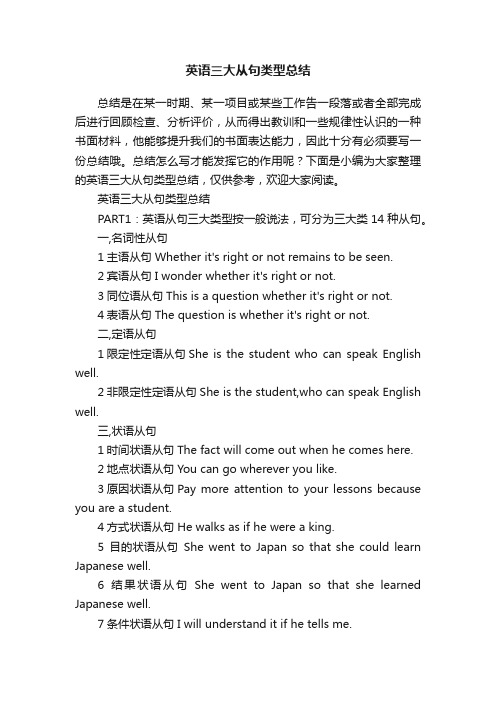
英语三大从句类型总结总结是在某一时期、某一项目或某些工作告一段落或者全部完成后进行回顾检查、分析评价,从而得出教训和一些规律性认识的一种书面材料,他能够提升我们的书面表达能力,因此十分有必须要写一份总结哦。
总结怎么写才能发挥它的作用呢?下面是小编为大家整理的英语三大从句类型总结,仅供参考,欢迎大家阅读。
英语三大从句类型总结PART1:英语从句三大类型按一般说法,可分为三大类14种从句。
一,名词性从句1主语从句Whether it's right or not remains to be seen.2宾语从句I wonder whether it's right or not.3同位语从句This is a question whether it's right or not.4表语从句The question is whether it's right or not.二,定语从句1限定性定语从句She is the student who can speak English well.2非限定性定语从句She is the student,who can speak English well.三,状语从句1时间状语从句The fact will come out when he comes here.2地点状语从句You can go wherever you like.3原因状语从句Pay more attention to your lessons because you are a student.4方式状语从句He walks as if he were a king.5目的状语从句She went to Japan so that she could learn Japanese well.6结果状语从句She went to Japan so that she learned Japanese well.7条件状语从句I will understand it if he tells me.8让步状语从句He knows a lot though he is little.PART2:经典名词性从句主语从句(subject clauses)在复合句中起主语作用的从句叫主语从句。
(完整)高中英语主要要掌握三大从句

高中英语主要要掌握三大从句。
分别是:1、定语从句(形容词从句)2、名词词从句(包括主语从句,宾语从句,表语从句,同位语从句)3、状语从句(副词性从句,包括时间,地点,结果,目的,原因等)一、定语从句:定语从句(Attributive Clauses)在句中做定语,修饰一个名词或代词,被修饰的名词,词组或代词即先行词。
定语从句通常出现在先行词之后,由关系词(关系代词或关系副词)引出。
1、关系代词引导的定语从句关系代词所代替的先行词是人或物的名词或代词,并在从句中充当主语、宾语、定语等成分。
关系代词在定语从句中作主词保持一致。
(1), who, whom, that这些词代替指人,“whom”作宾语指人,“that”既可作主语又可作宾语(作宾语可以省略),可以指人也可以指物。
(2),Which 用来指人或物(用作主语、宾语,作宾语时可以省略)(3),whose“whose”表示谁(可以为人也可以为物)的(东西)2、关系代词引导的定语从句(1),关系副词why主要用于修饰表示原因的名词(主要是the reason),同时它在定语从句中用作原因状语。
(2),关系副词when主要用于修饰表示时间的名词,同时它在定语从句中用作时间状语。
(3),关系副词where主要用于修饰表示地点的名词,同时它在定语从句中用作地点状语。
3、非限制性定语从句它起补充说明作用,缺少也不会影响全句的理解。
在非限制性定语从句的前面往往有逗号隔开。
二、名词性从句在句子中起名词作用的句子叫名词性从句(Noun Clauses)。
名词性从句的功能相当于名词词组, 它在复合句中能担任主语、宾语、表语、同位语、介词宾语等,因此根据它在句中不同的语法功能,名词性从句又可分别称为主语从句、宾语从句、表语从句和同位语从句。
引导名词性从句的连接词可分为三类:1、连词(5个):that (宾语从句或表语从句中that有时可以省略)whether,if (均表示“是否”表明从句内容的不确定性)as if ,as though (均表示“好像”,“似乎”)以上在从句中均不充当任何成分2、连接代词(9个):what, whatever, who, whoever, whom, whomever, whose, which, whichever3、连接副词(7个):when, where, how, why, whenever, wherever, however三、状语从句状语从句(Adverbial Clause)状语从句指句子用作状语时,起副词作用的句子。
英语三大从句
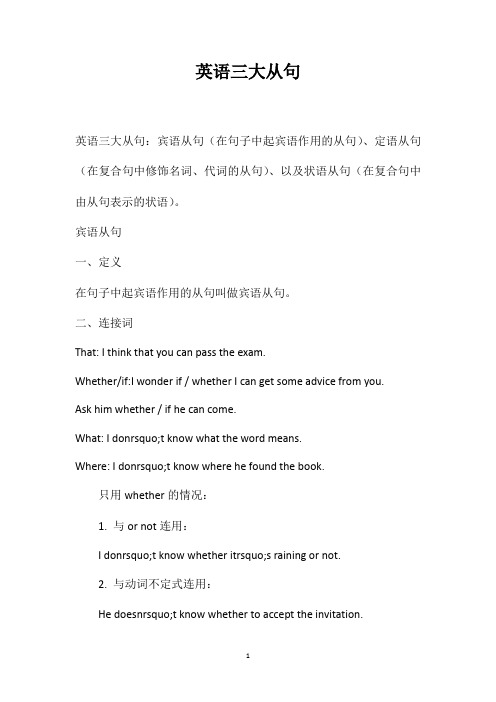
英语三大从句英语三大从句:宾语从句(在句子中起宾语作用的从句)、定语从句(在复合句中修饰名词、代词的从句)、以及状语从句(在复合句中由从句表示的状语)。
宾语从句一、定义在句子中起宾语作用的从句叫做宾语从句。
二、连接词That: I think that you can pass the exam.Whether/if:I wonder if / whether I can get some advice from you.Ask him whether / if he can come.What: I donrsquo;t know what the word means.Where: I donrsquo;t know where he found the book.只用whether的情况:1. 与or not连用:I donrsquo;t know whether itrsquo;s raining or not.2. 与动词不定式连用:He doesnrsquo;t know whether to accept the invitation.3. 连接词前有介词时:It depends on whether he is coming.三、时态1. 主句是一般现在时态,从句根据实际情况而定(各种时态均可)She wants to know what he has done for the exam.2.主句是一般过去时态,从句用相应的过去的时态。
1)She said that she was a student.2)She said that she would fly to Japan in a week.3)She said that she had finished her homework already.3. 如果宾语从句说的是客观真理、自然现象或事实时,这时宾语从句要用一般现在时态。
高中英语主要要掌握三大从句
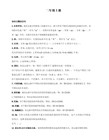
关系代词所代替的先行词是人或物的名词或代词,并在从句中充当主语、宾语、定语等成分。关系代词在定语从句中作主词保持一致。
(1), who, whom, that
这些词代替指人,“whom”作宾语指人,“that”既可作主语又可作宾语(作宾语可以省略),可以指人也可以指物。
引导名词性从句的连接词可分为三类:
1、连词(5个):that (宾语从句或表语从句中that有时可以省略) whether,if (均表示“是否”表明从句内容的不确定性)
as if ,as t
2、连接代词(9个):what, whatever, who, whoever, whom, whomever, whose, which, whichever
高中英语主要要掌握三大从句。
分别是:
1、定语从句(形容词从句)
2、名词词从句(包括主语从句,宾语从句,表语从句,同位语从句)
3、状语从句(副词性从句,包括时间,地点,结果,目的,原因等)
一、定语从句:
定语从句(Attributive Clauses)在句中做定语,修饰一个名词或代词,被修饰的名词,词组或代词即先行词。定语从句通常出现在先行词之后,由关系词(关系代词或关系副词)引出。
(3),关系副词where主要用于修饰表示地点的名词,同时它在定语从句中用作地点状语。
3、非限制性定语从句
它起补充说明作用,缺少也不会影响全句的理解。在非限制性定语从句的前面往往有逗号隔开。
二、名词性从句
在句子中起名词作用的句子叫名词性从句 (Noun Clauses)。 名词性从句的功能相当于名词词组, 它在复合句中能担任主语、宾语、表语、同位语、介词宾语等,因此根据它在句中不同的语法功能,名词性从句又可分别称为主语从句、宾语从句、表语从句和同位语从句。
从句的种类和用法详解

从句的种类和用法详解从句是英语语法中重要的一个部分,由一个主句和一个或多个从句组成。
从句可以增加语言的表达力,使句子更加丰富多样。
本文将详细解释从句的种类和用法,帮助读者更好地理解和运用从句。
一、名词性从句名词性从句在句子中充当名词的功能,可以作主语、宾语、表语或补语。
常见的名词性从句有三种种类:主语从句、宾语从句和表语从句。
1. 主语从句主语从句在句子中充当主语的角色,常以"that"引导。
例如:"That he is late surprises me."(他迟到了让我感到惊讶。
)2. 宾语从句宾语从句在句子中充当动词的宾语,通常由"that"引导,但在口语中可以省略。
例如:"I believe that he will come." (我相信他会来。
)"I know he will come." (我知道他会来。
)3. 表语从句表语从句在句子中充当表语的角色。
例如:"The important thing is that you try your best."(最重要的是你尽力而为。
)二、定语从句定语从句用来修饰名词或代词,常以关系代词或关系副词引导。
定语从句通常紧跟在被修饰的名词或代词之后。
例如:"The man who is speaking is my teacher."(正在说话的那个人是我的老师。
)"The book that I borrowed from the library is interesting."(我从图书馆借的那本书很有趣。
)三、状语从句状语从句用来表达时间、条件、原因、结果、目的、比较等信息,在句子中充当状语的角色。
根据不同的用途,状语从句可以分为六种类型。
1. 时间状语从句时间状语从句用来表示一个动作或事件发生的时间。
英语三大从句

英语三大从句LELE was finally revised on the morning of December 16, 2020复合句【语法要点】复合句是由一个主句加一个或几个从句所构成的句子。
从句只用作句子的一个成分,不能独立。
根据从句在句子中的作用,可分为名词性从句、定语从句和状语从句三类。
(一)名词性从句名词性从句包括主语从句、表语从句、宾语从句、同位语从句。
其关联词有连接词that、if、whether;疑问代词who、what、which和疑问副词when、where、how、why等。
1)if不能引导表语从句。
连接代词who、what、whose、which不能引导同位语从句。
2)有时as、as if/though、because也可以引导表语从句,能跟表语从句的谓语动词一般为系动词be、seem、look等。
例如:Things are not always as they seem to be.事情并不总是像表面上看来的那样。
It looks as if it were going to rain. It is because you eat too much.3)介词宾语不可以用which来引导,而要用what来引导。
例如:We can learn what we did not know. He will talk to us about what he saw in the .4)连词that引导的名词性从句除能用在except、but、in后之外很少作介词的宾语,。
其它一些介词的宾语从句如果由连词that引导,则需用it先行一步作形式宾语。
例如:He is a good student except that he is careless.You may depend on it that they will support you.5)若主句谓语动词是及物动词make、find、think、see、hear等,则把宾语从句置于宾语补足语之后,用it作形式宾语。
英语中的三大从句汇总
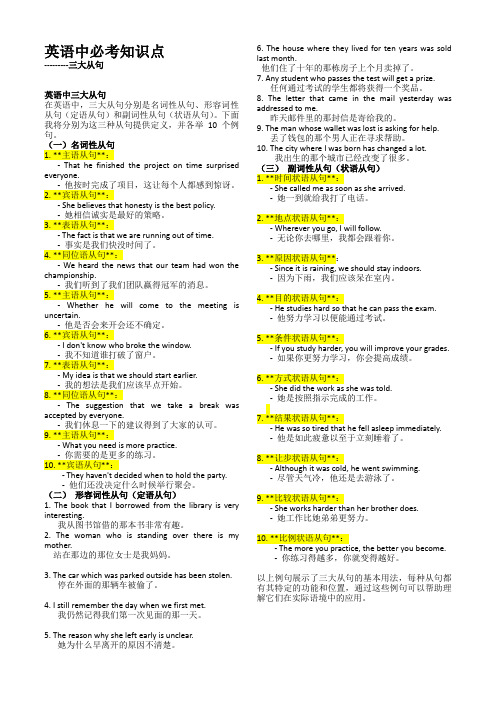
英语中必考知识点---------三大从句英语中三大从句在英语中,三大从句分别是名词性从句、形容词性从句(定语从句)和副词性从句(状语从句)。
下面我将分别为这三种从句提供定义,并各举10个例句。
(一)名词性从句1. **主语从句**:- That he finished the project on time surprised everyone.- 他按时完成了项目,这让每个人都感到惊讶。
2. **宾语从句**:- She believes that honesty is the best policy.- 她相信诚实是最好的策略。
3. **表语从句**:- The fact is that we are running out of time.- 事实是我们快没时间了。
4. **同位语从句**:- We heard the news that our team had won the championship.- 我们听到了我们团队赢得冠军的消息。
5. **主语从句**:- Whether he will come to the meeting is uncertain.- 他是否会来开会还不确定。
6. **宾语从句**:- I don't know who broke the window.- 我不知道谁打破了窗户。
7. **表语从句**:- My idea is that we should start earlier.- 我的想法是我们应该早点开始。
8. **同位语从句**:- The suggestion that we take a break was accepted by everyone.- 我们休息一下的建议得到了大家的认可。
9. **主语从句**:- What you need is more practice.- 你需要的是更多的练习。
10. **宾语从句**:- They haven't decided when to hold the party.- 他们还没决定什么时候举行聚会。
英语三大从句

英语三大从句 Prepared on 22 November 2020英语三大从句在英语中,主要有三大从句,即名词性从句(包括主语从句,宾语从句,表语从句,同位语从句)、形容词性从句(即定语从句)、副词性从句(即状语从句,包括时间、条件、结果、目的、原因、让步、地点、方式等)。
定语从句一、关系代词引导的定语从句关系代词代替前面的先行词,并且在定语从句中充当句子成分,可以作主语、宾语、定语等。
常见的关系代词有:who, that, which。
它们的主格、宾格和所有格如下表所示:(一)关系代词who, whom和 whose的用法who代替人,是主格,在定语从句中作主语。
An architect is a person who designs buildings. 建筑师是设计房屋的人。
whom代替人,是宾格,在定语从句作宾语,在非正式英语常可省略。
Do you know the gentleman whom we met in the school library yesterday 昨天我们在学校图书馆里遇到的那位先生你认识吗whose一般代替人,有时亦可代替物,是所有格,在定语从句作定语。
The girl student whose father is a senior engineer used to study abroad. 其父是一位高级工程师的那个女学生过去在国外留学。
Do you know the name of the hotel whose window we can see here 我们这儿能看到窗户的那个宾馆叫什么名字,你知道吗(关系代词whose指代先行词hotel,正式用法应该用of which。
whose window=the window of which,意思是:the window of the hotel。
)(二)关系代词which的用法which代替物,在定语从句作主语或宾语,作宾语时还可省略。
三大类从句

三大类从句I.名词从句1.主语从句e.g.1 That the moon moves round the earth is well known to all of us.e.g.2 When the meeting is to be held has not yet been decided.但主语从句有时过长,不符合英语尾重的原则,所以常采用形式主语it, 从而把主语从句放在后面。
如上述两句:e.g.(1) It is well known to all of us that the moon moves round the earth.e.g.(2) It has not yet been decided when the meeting is to be held.2.宾语从句e.g.3 We know that a parrot can’t really speak.e.g.4 She asked the teacher why some words were hard to remember.3.表语从句e.g.5 One idea is that fish is the best brain food.e.g.6 This is just when our company was being formed.4.同位语从句e.g.7 There is the news that some British customers will visit our company.II.定语从句III.状语从句练习:翻译下面的句子1.我们应当懂得语言学习不同于其他课程的学习。
2.众所周知,大西洋仅有太平洋的一半大。
3.他的结论是没有意义的信息很难记忆。
4.谁主持明天的会议还没有决定。
5.她向我解释为什么她要把小孩送进托儿所。
6.他想问经理要不要买一辆小汽车。
7.愈来愈多的人认识到这样一个事实:心脏病与人们的生活方式有关系。
英语 三大从句

英语三大从句三大从句包括名词性从句、形容词性从句和副词性从句。
名词性从句 (Noun Clause):英文:A noun clause is a type of dependent clause that functions as a noun within a sentence. It can act as the subject, object, or complement of the main clause.中文:名词性从句是一种在句子中起名词作用的从属从句。
它可以充当主句的主语、宾语或补语。
形容词性从句 (Adjective Clause):英文:An adjective clause is a dependent clause that describes or gives more information about a noun in the main clause. It usually begins with a relative pronoun (such as who, which, that) or a relative adverb (such as when, where, why).中文:形容词性从句是一个描述或提供更多信息关于主句中名词的从属从句。
它通常以关系代词(如who, which, that)或关系副词(如when, where, why)开头。
副词性从句 (Adverbial Clause):英文:An adverbial clause is a dependent clause that functions as an adverb in the sentence. It provides information about the time, place, manner, reason, orcondition of the action in the main clause.中文:副词性从句是一个在句子中起副词作用的从属从句。
初三英语语法串讲从句的分类与用法
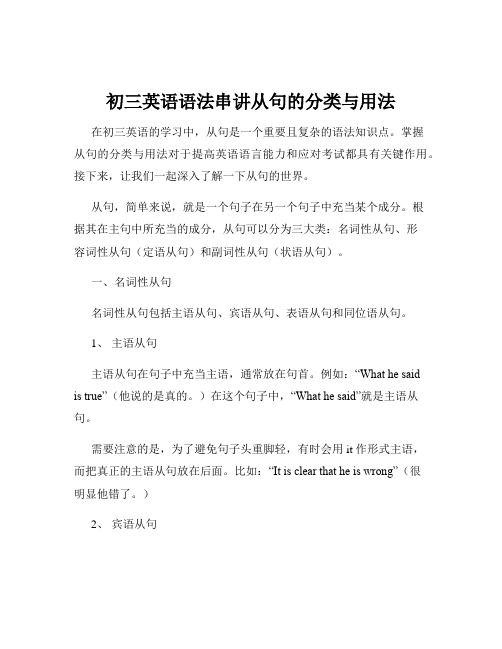
初三英语语法串讲从句的分类与用法在初三英语的学习中,从句是一个重要且复杂的语法知识点。
掌握从句的分类与用法对于提高英语语言能力和应对考试都具有关键作用。
接下来,让我们一起深入了解一下从句的世界。
从句,简单来说,就是一个句子在另一个句子中充当某个成分。
根据其在主句中所充当的成分,从句可以分为三大类:名词性从句、形容词性从句(定语从句)和副词性从句(状语从句)。
一、名词性从句名词性从句包括主语从句、宾语从句、表语从句和同位语从句。
1、主语从句主语从句在句子中充当主语,通常放在句首。
例如:“What he saidis true”(他说的是真的。
)在这个句子中,“What he said”就是主语从句。
需要注意的是,为了避免句子头重脚轻,有时会用 it 作形式主语,而把真正的主语从句放在后面。
比如:“It is clear that he is wrong”(很明显他错了。
)2、宾语从句宾语从句在句子中充当宾语,常跟在及物动词、介词或某些形容词后面。
例如:“I believe that he is honest”(我相信他是诚实的。
)“We are interested in what you said”(我们对你所说的感兴趣。
)宾语从句的语序要用陈述句语序,即“主语+谓语+其他”。
同时,要注意宾语从句的时态,要根据主句的时态来变化。
3、表语从句表语从句在句子中充当表语,位于系动词之后。
例如:“The problem is whether we can finish the work on time”(问题是我们能否按时完成工作。
)4、同位语从句同位语从句用于解释说明前面的名词的具体内容。
常见的名词有:fact, news, idea, thought, hope 等。
例如:“The news that he will come is true”(他要来的消息是真的。
)二、形容词性从句(定语从句)定语从句在句中起定语作用,修饰一个名词或代词。
三大从句知识点总结

三大从句知识点总结一、名词性从句名词性从句是在句子中充当名词的作用,可以位于主句中的主语、宾语、表语或者介词宾语的位置,起着名词的作用,因此也被称为从句名词。
名词性从句主要包括宾语从句、主语从句、表语从句和同位语从句等几种。
1. 宾语从句宾语从句用来充当主句中的及物动词(transitive verb)或介词后面的宾语,例如:I know (that) he is coming.(我知道他要来了。
)He said (that) he would come tomorrow.(他说他明天会来。
)在上面的两个例句中,that引导的从句分别充当了know和said后面的宾语。
2. 主语从句主语从句用来作为整个主句的主语,例如:That he is so successful surprises everyone.(他这么成功让每个人都感到惊讶。
)What he is saying is true.(他所说的是真的。
)在上面的两个例句中,从句that he is so successful和what he is saying分别作为整个主句的主语。
3. 表语从句表语从句用来作为及物动词后的表语,例如:The problem is that we don't have enough time.(问题就在于我们没有足够的时间。
)在这个例句中,从句that we don't have enough time充当了动词is后的表语。
4. 同位语从句同位语从句用来解释或者说明名词的内容,例如:The news that he won the prize is exciting.(他获奖的消息令人兴奋。
)在这个例句中,从句that he won the prize充当了news这个名词的同位语。
名词性从句在句子中起着非常重要的作用,能够充分地承担名词的功能,并且丰富了句子的表达方式。
二、定语从句定语从句用来修饰名词或代词,对其进行进一步的说明或者限定,增加句子的信息量。
初中英语语法三大从句汇总
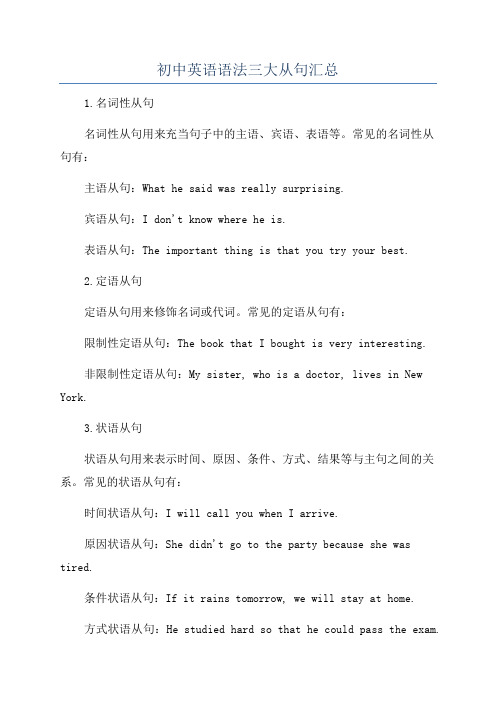
初中英语语法三大从句汇总
1.名词性从句
名词性从句用来充当句子中的主语、宾语、表语等。
常见的名词性从句有:
主语从句:What he said was really surprising.
宾语从句:I don't know where he is.
表语从句:The important thing is that you try your best.
2.定语从句
定语从句用来修饰名词或代词。
常见的定语从句有:
限制性定语从句:The book that I bought is very interesting.
非限制性定语从句:My sister, who is a doctor, lives in New York.
3.状语从句
状语从句用来表示时间、原因、条件、方式、结果等与主句之间的关系。
常见的状语从句有:
时间状语从句:I will call you when I arrive.
原因状语从句:She didn't go to the party because she was tired.
条件状语从句:If it rains tomorrow, we will stay at home.
方式状语从句:He studied hard so that he could pass the exam.
结果状语从句:She was so tired that she couldn't walk.。
三大从句包括什么

三大从句包括什么1、名词性从句(包括主语从句,宾语从句,表语从句,同位语从句);2、形容词性从句(即定语从句);3、副词性从句(即状语从句,包括时间、条件、结果、目的、原因、让步、地点、方式等)。
1①I took an umbrella, so that I didn't get wet in the rain.我带了把伞,因此我没淋到雨。
②雨下得如此大以至于(导致……结果)我们不能出去。
It isso heavy a rainthat we can't go out.It issuch a heavy rainthat we can't go out.It is rainingso heavily thatwe can't go out.注:so是副词,可修饰形容词/副词,such是形容词,可修饰名词/名词词组。
so/such和that之间有名词时:①可数名词复数和不可数名词,只用such②可数名词单数,so,such都可以语序不同③名词前有多少、没有名词时只用so2①Take an umbrella in case it rains.带把伞以防下雨。
(以防:为了防止)② I take an umbrella so that(=in order that) I won't get wet in the rain.为了不被雨淋湿,我打了把伞。
(主将从现)注意跟前句对比:I took an umbrella, so that I didn't get wet in the rain.我带了把伞,因此我没淋到雨。
(主过从过)。
三大从句讲解
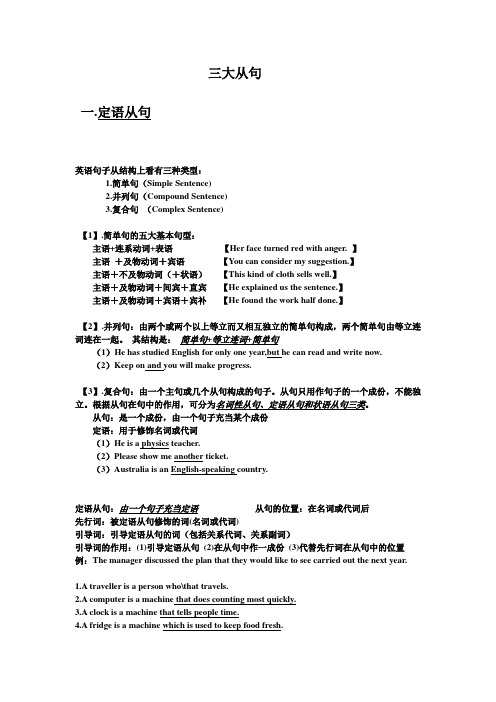
三大从句一.定语从句英语句子从结构上看有三种类型:1.简单句(Simple Sentence)2.并列句(Compound Sentence)3.复合句(Complex Sentence)【1】.简单句的五大基本句型:主语+连系动词+表语【Her face turned red with anger. 】主语+及物动词+宾语【Y ou can consider my suggestion.】主语+不及物动词(+状语)【This kind of cloth sells well.】主语+及物动词+间宾+直宾【He explained us the sentence.】主语+及物动词+宾语+宾补【He found the work half done.】【2】.并列句:由两个或两个以上等立而又相互独立的简单句构成,两个简单句由等立连词连在一起。
其结构是:简单句+等立连词+简单句(1)He has studied English for only one year,but he can read and write now.(2)Keep on and you will make progress.【3】.复合句:由一个主句或几个从句构成的句子。
从句只用作句子的一个成份,不能独立。
根据从句在句中的作用,可分为名词性从句、定语从句和状语从句三类。
从句:是一个成份,由一个句子充当某个成份定语:用于修饰名词或代词(1)He is a physics teacher.(2)Please show me another ticket.(3)Australia is an English-speaking country.定语从句:由一个句子充当定语从句的位置:在名词或代词后先行词:被定语从句修饰的词(名词或代词)引导词:引导定语从句的词(包括关系代词、关系副词)引导词的作用:(1)引导定语从句(2)在从句中作一成份(3)代替先行词在从句中的位置例:The manager discussed the plan that they would like to see carried out the next year.1.A traveller is a person who\that travels.2.A computer is a machine that does counting most quickly.3.A clock is a machine that tells people time.4.A fridge is a machine which is used to keep food fresh.5.A tailor is a person who makes clothes.6.A beggar is a person who makes a living by begging.7.A teacher is a person who gives lessons to students.8.A nurse is a person that looks after people who are ill.9.The panda is a kind of animal that can be found only in China.10.April 1st is the day which is called April Fool’s Day in the West.关系代词和关系副词的作用关系代词和关系副词如何区别1.The reason ___why__he missed the speech is that he forgot the time.2.The reason____that\which___he gave us sounded reasonable.3.I’ll never forget the day ______that\which____we spent together in Paris.4.I’ll remember the day____when____we stayed together at that time.5.This is the factory____that\which___we visited last year.6.This is the house ____where___Lincoln once lived.Remember: 引导词用关系代词还是用关系副词关键要看他们在从句中作什么成份而定。
初中英语语法讲解--名词性从句、形容词性从句、副词性从句三大从句讲解

初中英语语法讲解:名词性从句、形容词性从句、副词性从句一、名词性从句1. 概念名词性从句是指在句子中起名词作用的从句,包括主语从句、宾语从句、表语从句和同位语从句。
2. 搭配与用法主语从句:作为句子的主语,通常使用连接词that(无实际意义,不可省略)或whether/if(表示选择,不可省略)引导。
例句:That he will come to the party remains uncertain.(他是否会来参加聚会还不确定。
)宾语从句:作为动词或介词的宾语,可以由that、if/whether、特殊疑问词等引导。
例句:I don't know if he will come.(我不知道他是否会来。
)表语从句:作为连系动词的表语,通常由that引导,但that通常可以省略。
例句:The fact is that he didn't come.(事实是,他没来。
)同位语从句:用于解释说明前面的名词,通常由that引导,但that不可省略。
例句:The news that he resigned was a surprise.(他辞职的消息是个惊喜。
)3. 注意事项宾语从句中,当主句的谓语动词是think、believe、expect、suppose等表示心理活动的动词时,如果宾语从句表示的是事实,则宾语从句的否定通常要转移到主句上来表达。
例句:I don't think he will come.(我认为他不会来。
)在名词性从句中,一般不使用疑问句语序,而是使用陈述句语序。
例句:Can you tell me how I can get to the park?(请告诉我如何去公园?)而不是Can you tell me how can I get to the park?二、形容词性从句(定语从句)1. 概念形容词性从句,也称为定语从句,用于修饰或限定一个名词或代词,描述这个名词或代词的性质或特征。
高中英语三大从句解释

1、定语从句(形容词从句)2、名词词从句(包括主语从句,宾语从句,表语从句,同位语从句)3、状语从句(副词性从句,包括时间,地点,结果,目的,原因等)一、定语从句:定语从句(Attributive Clauses)在句中做定语,修饰一个名词或代词,被修饰的名词,词组或代词即先行词。
定语从句通常出现在先行词之后,由关系词(关系代词或关系副词)引出。
1、关系代词引导的定语从句关系代词所代替的先行词是人或物的名词或代词,并在从句中充当主语、宾语、定语等成分。
关系代词在定语从句中作主词保持一致。
(1), who, whom, that这些词代替指人,“whom”作宾语指人,“that”既可作主语又可作宾语(作宾语可以省略),可以指人也可以指物。
(2),Which 用来指人或物(用作主语、宾语,作宾语时可以省略)(3),whose“whose”表示谁(可以为人也可以为物)的(东西)2、关系代词引导的定语从句(1),关系副词why主要用于修饰表示原因的名词(主要是the reason),同时它在定语从句中用作原因状语。
(2),关系副词when主要用于修饰表示时间的名词,同时它在定语从句中用作时间状语。
(3),关系副词where主要用于修饰表示地点的名词,同时它在定语从句中用作地点状语。
3、非限制性定语从句它起补充说明作用,缺少也不会影响全句的理解。
在非限制性定语从句的前面往往有逗号隔开。
二、名词性从句在句子中起名词作用的句子叫名词性从句(Noun Clauses)。
名词性从句的功能相当于名词词组, 它在复合句中能担任主语、宾语、表语、同位语、介词宾语等,因此根据它在句中不同的语法功能,名词性从句又可分别称为主语从句、宾语从句、表语从句和同位语从句。
引导名词性从句的连接词可分为三类:1、连词(5个):that (宾语从句或表语从句中that有时可以省略)whether,if (均表示“是否”表明从句内容的不确定性)as if ,as though (均表示“好像”,“似乎”)以上在从句中均不充当任何成分2、连接代词(9个):what, whatever, who, whoever, whom, whomever, whose, which, whichever3、连接副词(7个):when, where, how, why, whenever, wherever, however三、状语从句状语从句(Adverbial Clause)状语从句指句子用作状语时,起副词作用的句子。
- 1、下载文档前请自行甄别文档内容的完整性,平台不提供额外的编辑、内容补充、找答案等附加服务。
- 2、"仅部分预览"的文档,不可在线预览部分如存在完整性等问题,可反馈申请退款(可完整预览的文档不适用该条件!)。
- 3、如文档侵犯您的权益,请联系客服反馈,我们会尽快为您处理(人工客服工作时间:9:00-18:30)。
PART1:英语从句三大类型按一般说法,可分为三大类14种从句。
一,名词性从句1主语从句Whether it's right or not remains to be seen.2宾语从句I wonder whether it's right or not.3同位语从句This is a question whether it's right or not.4表语从句The question is whether it's right or not.二,定语从句1限定性定语从句She is the student who can speak English well.2非限定性定语从句She is the student,who can speak English well.三,状语从句1时间状语从句The fact will come out when he comes here.2地点状语从句You can go wherever you like.3原因状语从句Pay more attention to your lessons because you are a student. 4方式状语从句He walks as if he were a king.5目的状语从句She went to Japan so that she could learn Japanese well.6结果状语从句She went to Japan so that she learned Japanese well.7条件状语从句I will understand it if he tells me.8让步状语从句He knows a lot though he is little.PART2:经典名词性从句主语从句(subject clauses)在复合句中起主语作用的从句叫主语从句。
引导主语从句的词有从属连词、、关系代词、连接副词等。
引导主语从句的关联词有从属连词that、whether,关系代词:who, what, which, whom, whose, whatever, whoever, whomever, whichever;关系副词:when, where, how, why, however, whenever, wherever等。
That you don’t like him is none of my business.你不喜欢她不管我的事。
What he said is true. 他说的是真的。
Do you remember how he arrived almost at the end of the party?你记得他几乎是在宴会快结束时才到的吗? This party's really where it's at, man! 啊,这个晚会真棒!Tell us how you fulfilled the heavy task ahead of schedule.告诉我们,你们是怎样提前完成这一艰巨任务的。
We have reason to believe that the fighting on the border may develop into a full-blown war. (喻)我们有理由相信边境上的冲突可能发展成一场全面战争。
He said that he would come. 他说他要来。
Whether the football game will be played depends on the weather.足球比赛是否举行将视天气而定。
表语从句用作表语的从句叫作表语从句,它位于主句中的连系动词之后。
引导表语从句的词有从属连词that、whether、as though(if);关系代词who, what, which, whom, whose, whatever, whoever, whomever, whichever等;关系副词when, where, why, how, however, whenever, wherever等。
可以接表语从句的连系动词由be, look, remain, seem等。
That引导表语从句时,在口语中,间或可以省略。
The trouble is that we are short of money.困难是我们资金短缺。
That is why stone walls are used instead of fences around New England fields.这就是为什么在新英格兰用石头墙而不用栅栏的原因。
At that time, it seemed as if I couldn't think of the right word anyhow.当时,我似乎怎么也想不出一个恰当的字眼来。
宾语从句(object clauses)用作宾语的从句叫做宾语从句。
宾语从句的位置与陈述句基本结构中的宾语相同。
宾语从句可作谓语动词的宾语,也可以作介词和非谓语动词(动词不定式、动名词、分词)和某些形容词的宾语。
宾语从句可以由从属连词that whether、if,关系代词what, who, whose, which和关系副词when、where、how、why等引导。
He said he wanted to go to town. 他说他想去城里。
I hope you'll be better soon.我希望你能很快好起来。
I’m so glad that you were able to come to this party.你能设法抽空出席这个交际会,我很高兴。
I know nothing about it except what I have read in the papers.除了在报上读到的以外,我对这件事一无所知。
Most of the Chinese people usually go to work on the bike except when it rains.除了雨天,大多数中国人一般都骑自行车上班。
He asked me whether she was coming. 他问我,她来还是不来。
同位语从句用作同位语的从句叫同位语从句。
它一般跟在抽象名词fact,idea,news,hope,belief,thought,truth,doubt,suggestion,warning, instruction,reason,information, question等之后,对这些名词进行说明或解释。
引导同位语从句的词除连词that,whether外,还有关系代词what, which, who, 以及关系副词how,when,where,why等。
It is a fact that smoking is a danger to health.吸烟危害健康,这是事实。
I have no idea what you mean.我一点儿也不明白你的意思。
He made the suggestion that we go by train. 他建议我们坐火车去。
There is no doubt that he is guilty. 毫无疑问,他是有罪的。
PART3:经典定语从句1.窗户朝南的那间房间是我的。
The room whose window faces south is mine.=The room of which the window faces south is mine.1.整座城市躺在废墟中,其中百分子75的工厂和大楼消失不见了。
The whole city, 75% of whose factories and buildings were gone, lay in ruins.2.我们公司有2000工人,三分之二是女工。
Our company has 2000 workers, of whom two thirds/ two thirds of whom are women.3.那些被困在废墟里的人已经得救了。
Those who were trapped under the ruins finally got rescued.4.你们刚才谈论的那场地震好可怕呀!The earthquake that you were talking about sounded frightening/shocking.=The earthquake about which you were talking sounded frightening.5.我的家人都是音乐爱好者,今晚将去看电影。
My family, all of whom are music lovers, are going to the movie tonight.6.我们正在看的这幢大楼过去曾经是一家医院。
The building which we are looking at used to be a hospital.7.约翰向母亲说起过把他在国外见过的人和城市。
John once talked to his mom about the people and cities that he had visited abroad.8.他是去过伦敦的一位以观光者之一。
He is one of the tourists who have been to London.9.他是这些观光者当中唯一去过伦敦的。
He is the only one of the visitors that/who has been to London.10.这就是你们上个礼拜参观过的学校吗?Is this the school that you visited last Sunday?11.这所学校就是你们上个礼拜参观过的那所吗?Is this school the one that you visited last Sunday?12.他们曾经居住过的是在这个地方里。
It is in this place that he once lived.13.这是他们曾经住过的地址。
It is the place where he once lived.14.他有两个儿子,每一位都看起来像他。
He has two sons, either of whom looks like him.15.他有连个儿子,并且每一个都看起来像他。
He has two sons, and either of them looks like him.16.这是一本封面是蓝色的书。
